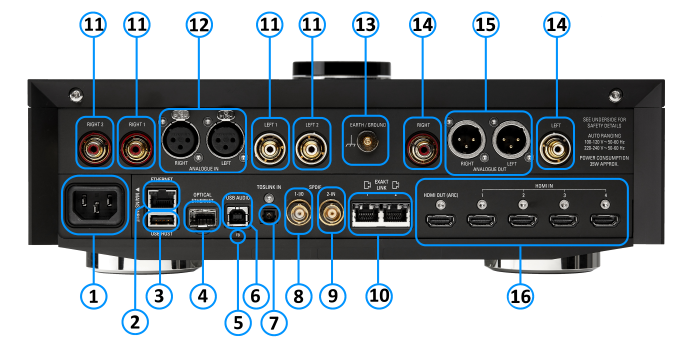Difference between revisions of "Template:Backpanel:Klimax DSM-3 - AV variant"
m |
m |
||
| Line 6: | Line 6: | ||
# {{link:MAINS INPUT}} | # {{link:MAINS INPUT}} | ||
# {{link:ETHERNET1G}} | # {{link:ETHERNET1G}} | ||
| − | # | + | # {{link:USB-A}} |
# {{link:ETHERNET_Optical}} | # {{link:ETHERNET_Optical}} | ||
# {{link:FALLBACK}} | # {{link:FALLBACK}} | ||
| − | # | + | # {{link:USB-B}}<sup>'''6'''</sup> |
# '''OPTICAL DIGITAL INPUT''' (Toslink)<sup>'''5'''</sup> - To connect sources with Toslink (optical) digital outputs. | # '''OPTICAL DIGITAL INPUT''' (Toslink)<sup>'''5'''</sup> - To connect sources with Toslink (optical) digital outputs. | ||
# [[Cables_%26_terminations#SPDIF|<u>'''DIGITAL INPUTS/OUTPUT'''</u>]] (Spdif)<sup>'''4'''</sup> - To connect sources with SPDIF(RCA) digital outputs or use as a SPDIF digital input . <!--One can be configured as a SPDIF output--> | # [[Cables_%26_terminations#SPDIF|<u>'''DIGITAL INPUTS/OUTPUT'''</u>]] (Spdif)<sup>'''4'''</sup> - To connect sources with SPDIF(RCA) digital outputs or use as a SPDIF digital input . <!--One can be configured as a SPDIF output--> | ||
Revision as of 09:02, 7 April 2021
Klimax DSM (AV variant)

Information of what each connector is and a basic specification of these connectors
Click for more....
- MAINS INPUT - To connect to the mains electricity supply.
- ETHERNET - To connect to a network (100Base-T / 1000Base-T)
- USB-A socket: for Service Use only This socket does not accept USB sticks / USB-Drives
- FIBRE ETHERNET - SFP module socket to connect to a fibre network
- FALLBACK - To put the device into Fallback mode (used when reprogramming)
- USB-B socket - To connect to a PC/MAC for Class 2.0 PCM Asynchronous USB Audio playback6
- OPTICAL DIGITAL INPUT (Toslink)5 - To connect sources with Toslink (optical) digital outputs.
- DIGITAL INPUTS/OUTPUT (Spdif)4 - To connect sources with SPDIF(RCA) digital outputs or use as a SPDIF digital input .
- DIGITAL INPUTS (Spdif)5 - To connect sources with Spdif (RCA) digital outputs.
- EXAKT LINK - To connect to Exakt compatible devices (Exaktbox, Exakt Speakers, Urika II etc)
- ANALOGUE INPUTS (RCA-Line level)1 & 2 - To connect sources with RCA analogue outputs.
- BALANCED INPUTS'(XLR-Line level)1 & 2 -- To connect sources with balanced (XLR) outputs.
- PHONO GROUND - To connect to a turntable grounding terminal.
- ANALOGUE OUTPUT (RCA,variable level)3,4 - To connect to a power amplifier, headphones etc..
- ANALOGUE OUTPUT (XLR,variable level)3 - To connect to a power amplifier, headphones etc...
- HDMI INPUTS' & HDMI OUTPUT with ARC (HDMI)7 - To connect sources with 1.4 & 2.07 HDMI output and TV with ARC capability.
Notes:
1 Analogue inputs: Input range adjustable 1V-4V rms, impedance 10kΩ
2 with ADC of 192kHz/24bit
3 RCA Output transformer option
4 Independently switchable allowing either RCA or XLR, RCA and XLR outputs
5 Digital inputs: 32kHz, 44.1kHz, 48kHz, 88.2kHz, 96kHz, 176.4kHz, 192kHz
6 USB Supported Sample rates: 44.1, 48, 88.2, 96, 176.4, 192
7HDMI 2.0 Supports HDCP 2.2 up to and including 60Hz UHD. We recommend using HDMI Certified cables